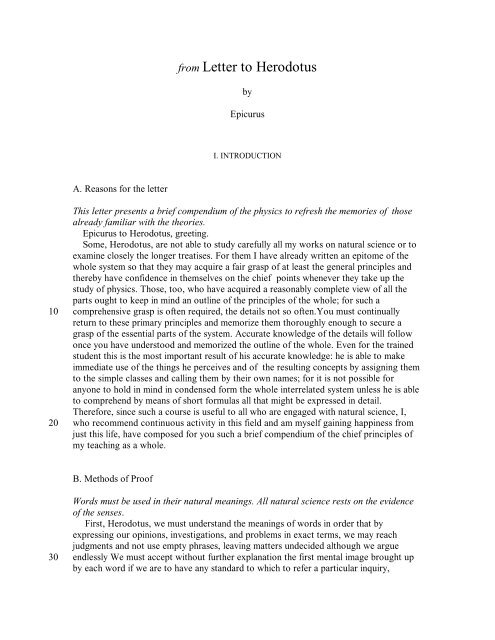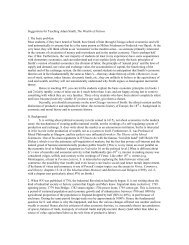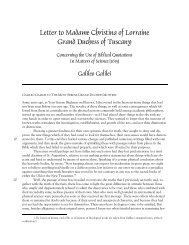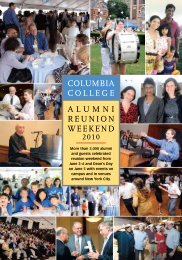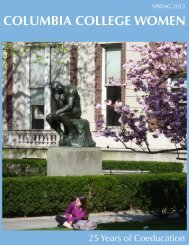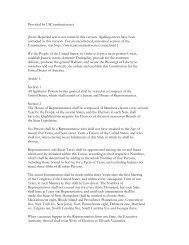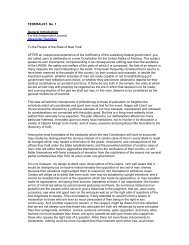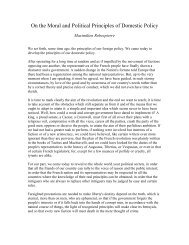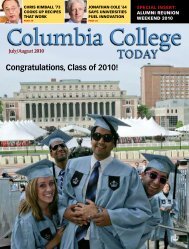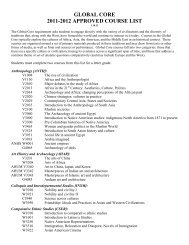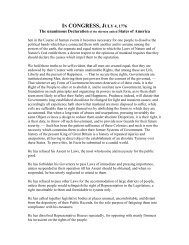from Letter to Herodotus - Columbia College
from Letter to Herodotus - Columbia College
from Letter to Herodotus - Columbia College
Create successful ePaper yourself
Turn your PDF publications into a flip-book with our unique Google optimized e-Paper software.
<strong>from</strong> <strong>Letter</strong> <strong>to</strong> <strong>Herodotus</strong><br />
by<br />
Epicurus<br />
I. INTRODUCTION<br />
A. Reasons for the letter<br />
10<br />
20<br />
This letter presents a brief compendium of the physics <strong>to</strong> refresh the memories of those<br />
already familiar with the theories.<br />
Epicurus <strong>to</strong> <strong>Herodotus</strong>, greeting.<br />
Some, <strong>Herodotus</strong>, are not able <strong>to</strong> study carefully all my works on natural science or <strong>to</strong><br />
examine closely the longer treatises. For them I have already written an epi<strong>to</strong>me of the<br />
whole system so that they may acquire a fair grasp of at least the general principles and<br />
thereby have confidence in themselves on the chief points whenever they take up the<br />
study of physics. Those, <strong>to</strong>o, who have acquired a reasonably complete view of all the<br />
parts ought <strong>to</strong> keep in mind an outline of the principles of the whole; for such a<br />
comprehensive grasp is often required, the details not so often.You must continually<br />
return <strong>to</strong> these primary principles and memorize them thoroughly enough <strong>to</strong> secure a<br />
grasp of the essential parts of the system. Accurate knowledge of the details will follow<br />
once you have unders<strong>to</strong>od and memorized the outline of the whole. Even for the trained<br />
student this is the most important result of his accurate knowledge: he is able <strong>to</strong> make<br />
immediate use of the things he perceives and of the resulting concepts by assigning them<br />
<strong>to</strong> the simple classes and calling them by their own names; for it is not possible for<br />
anyone <strong>to</strong> hold in mind in condensed form the whole interrelated system unless he is able<br />
<strong>to</strong> comprehend by means of short formulas all that might be expressed in detail.<br />
Therefore, since such a course is useful <strong>to</strong> all who are engaged with natural science, I,<br />
who recommend continuous activity in this field and am myself gaining happiness <strong>from</strong><br />
just this life, have composed for you such a brief compendium of the chief principles of<br />
my teaching as a whole.<br />
B. Methods of Proof<br />
30<br />
Words must be used in their natural meanings. All natural science rests on the evidence<br />
of the senses.<br />
First, <strong>Herodotus</strong>, we must understand the meanings of words in order that by<br />
expressing our opinions, investigations, and problems in exact terms, we may reach<br />
judgments and not use empty phrases, leaving matters undecided although we argue<br />
endlessly We must accept without further explanation the first mental image brought up<br />
by each word if we are <strong>to</strong> have any standard <strong>to</strong> which <strong>to</strong> refer a particular inquiry,
<strong>from</strong> <strong>Letter</strong> <strong>to</strong> <strong>Herodotus</strong> / Epicurus 2<br />
problem, or opinion. Next, we must use our sensations as the foundation of all our<br />
investigations; that is, we must base investigations on the mental apprehensions, upon the<br />
purposeful use of the several senses that furnish us with knowledge, and upon our<br />
immediate feelings. In these ways we can form judgments on those matters that can be<br />
confirmed bv the senses and also on those beyond their reach.<br />
40<br />
II. THE UNIVERSE<br />
A. Basic Principles<br />
50<br />
Matter can be neither created nor destroyed. The universe as a whole is unchanging.<br />
Now that this has been established we must consider the phenomena that cannot be<br />
perceived by the senses. The first principle is that nothing can be created <strong>from</strong> the<br />
nonexistent; for otherwise any thing would be formed <strong>from</strong> anything without the need of<br />
seed. If all that disappears were destroyed in<strong>to</strong> the non-existent, all matter would be<br />
destroyed, since that in<strong>to</strong> which it would be dissolved has no existence. Truly this<br />
universe has always been such as it now is, and so it shall always be; for there is nothing<br />
in<strong>to</strong> which it can change, and there is nothing outside the universe that can enter in<strong>to</strong> it<br />
and bring about a change.<br />
B. A<strong>to</strong>ms and the Void<br />
60<br />
The universe consists of matter, recognized by the senses, and void, in which matter<br />
moves. Other conceivable things are "accidents" or "properties" of these. Sensible<br />
objects are composed of a<strong>to</strong>ms, which themselves are indestructible.<br />
Moreover, the universe consists of material bodies and void. That the bodies exist is<br />
made clear <strong>to</strong> all by sensation itself, on which reason must base its judgment. in regard <strong>to</strong><br />
what is imperceptible, as I have said above. If that which we call "void" and "space" and<br />
"the un<strong>to</strong>uchable" did not exist, the particles of matter would have no place in which <strong>to</strong><br />
exist or through which <strong>to</strong> move, as it is clear they do move.<br />
In addition <strong>to</strong> these two, there is nothing that we can grasp in the mind, either through<br />
concepts or through analogy with concepts, that has real existence and is not referred <strong>to</strong><br />
merely as a property or an accident of material things or of the void.<br />
Of material things, some are compounds, others are the simple particles <strong>from</strong> which<br />
the compounds are formed. The particles are indivisible and unchangeable, as is<br />
necessary if all is not <strong>to</strong> be dissolved <strong>to</strong> nothing, but something strong is <strong>to</strong> remain after<br />
the dissolution of the compounds, something solid, which cannot be destroyed in any<br />
way. Therefore, it is necessary that the first beginnings be indivisible particles of matter.<br />
70<br />
C. The Infinite of the Universe
<strong>from</strong> <strong>Letter</strong> <strong>to</strong> <strong>Herodotus</strong> / Epicurus 3<br />
80<br />
90<br />
i. The universe is infinite, for there is nothing <strong>to</strong> bound it, and each of its elements is<br />
decided also infinite.<br />
Moreover, the universe as a whole is infinite, for whatever is limited has an outermost<br />
edge <strong>to</strong> limit it, and such an edge is defined by something beyond. Since the universe<br />
does not have an edge, it has no limit; and since it lacks a limit, it is infinite and<br />
unbounded. Moreover, the universe is infinite both in the number of its a<strong>to</strong>ms and in the<br />
extent of its void. If, on the one hand, the void were infinite and matter finite, the a<strong>to</strong>ms<br />
would not remain anywhere but would be carried away and scattered through the infinite<br />
void, since there would be no a<strong>to</strong>ms <strong>from</strong> without <strong>to</strong> support them and hold them <strong>to</strong>gether<br />
by striking them. If, on the other hand, the void were finite, there would not be room in it<br />
for an infinite number of a<strong>to</strong>ms.<br />
ii. To account for the differences in sensible objects, the a<strong>to</strong>ms must exist in many forms,<br />
the number of different forms being inconceivably great but not infinite, while the number<br />
of a<strong>to</strong>ms of each form is infinite.<br />
In addition, the indivisible, solid particles of matter, <strong>from</strong> which composite bodies are<br />
formed and in<strong>to</strong> which such bodies are dissolved, exist in so many different shapes that<br />
the mind cannot grasp their number; for it would not be possible for visible objects <strong>to</strong><br />
exhibit such great variation in form and quality if they were made by repeated use of<br />
a<strong>to</strong>ms of conceivable variety The number of a<strong>to</strong>ms of each shape is infinite; but the<br />
number of varieties cannot be infinite, only inconceivably great.<br />
D. The Motion of the A<strong>to</strong>ms<br />
100<br />
The a<strong>to</strong>ms move continuously, both freely in space, and with more limited motion forming<br />
gases, liquids, and solids.This motion had no beginning.<br />
The a<strong>to</strong>ms move without interruption through all time.Some of them (fall in a straight<br />
line; some swerve <strong>from</strong> their courses; and others move back and forth as the result of<br />
collisions. These last make up the objects that our senses recognize.Some of those that<br />
move in this way after collisions) separate far <strong>from</strong> each other; the others maintain a<br />
vibrating motion, either closely entangled with each other or confined by other a<strong>to</strong>ms that<br />
have become entangled. There are two reasons for this continued vibration. The nature of<br />
the void that separates each of the a<strong>to</strong>ms <strong>from</strong> the next permits it, for the void is not able<br />
<strong>to</strong> offer any resistance; and the elasticity that is characteristic of the a<strong>to</strong>ms causes them <strong>to</strong><br />
rebound after each collision. The degree of entanglement of the a<strong>to</strong>ms determines the<br />
extent of the recoil <strong>from</strong> the collision. These motions had no beginning, for the a<strong>to</strong>ms and<br />
the void have always existed. If all these things are remembered, a statement as brief as<br />
this provides a sufficient outline for our understanding of the nature of that which exists.<br />
E. The Infinite Number of Worlds<br />
110<br />
Because a<strong>to</strong>ms and space are infinite, the number of worlds, like or unlike ours, is also<br />
infinite.<br />
Finally, the number of worlds, some like ours and some unlike, is also infinite. For the
<strong>from</strong> <strong>Letter</strong> <strong>to</strong> <strong>Herodotus</strong> / Epicurus 4<br />
a<strong>to</strong>ms are infinite in number, as has been shown above, and they move through the<br />
greatest distances. The a<strong>to</strong>ms suited for the creation and maintenance of a world have not<br />
been used up in the formation of a single world or of a limited number of them, whether<br />
like our world or different <strong>from</strong> it. There is nothing therefore that will stand in the way of<br />
there being an infinite number of worlds.<br />
120<br />
V. THE SOUL<br />
A. Composition of the Soul<br />
130<br />
The soul is material, composed of finely divided particles, some like breath, some like<br />
fire, and some of a third, unnamed kind.<br />
Next, referring <strong>to</strong> the sensations and the feelings as the most certain foundation for<br />
belief, we must see that, in general terms, the soul is a finely divided, material thing,<br />
scattered through the whole aggregation of a<strong>to</strong>ms that make up the body, most similar <strong>to</strong><br />
breath with a certain admixture of heat, in some ways resembling the one, in some ways<br />
the other.But there is also a part of the soul that goes beyond even these two in fineness,<br />
and for this reason it is more ready <strong>to</strong> share in the feelings of the body.All this is made<br />
evident <strong>to</strong> us by the powers of the soul, that is, by its feelings, its rapidity of action, its<br />
rational faculties, and its possession of those things whose loss brings death <strong>to</strong> us.<br />
B. The Soul and the Body in Sensation<br />
140<br />
150<br />
The soul experiences sensation only when enclosed in the body; and the body receives<br />
<strong>from</strong> the soul a share in this sensation. Sensation may survive the loss of parts of the<br />
body, but it ceases with the destruction of the soul or of the whole body.<br />
Next, we must conclude that the primary cause of sensation is in the soul; yet it would<br />
not have acquired sensation if it had not been in some way enclosed by the rest of the<br />
body. But the rest of the body, having given the soul the proper setting for experiencing<br />
sensation, has itself also gained <strong>from</strong> the soul a certain share in this capacity. Yet it does<br />
not fully share with the soul, and for this reason when the soul departs, the body no<br />
longer experiences sensation; for the body did not have this capacity in itself but made<br />
sensation possible for that other that had come in<strong>to</strong> existence along with it, namely the<br />
soul. The soul, thanks <strong>to</strong> the power perfected in it by the motions of the body, at once<br />
bringing <strong>to</strong> completion its own power <strong>to</strong> experience sensation, returned a share of this<br />
power <strong>to</strong> the body because of their close contact and conunon feelings, as I have said. For<br />
this reason, sensation is never lost while the soul remains, even though other parts of the<br />
body have been destroyed. Indeed, even if a portion of the soul is lost with the loss in<br />
whole or in part of that portion of the body that enclosed it, if any part at all of the soul<br />
survives, it will still experience sensation; but when the rest of the body survives both as<br />
a whole and part by part, it has no sensation if that collection of a<strong>to</strong>ms, small though it<br />
be, that makes up the soul has been lost. However, if the whole body is destroyed, the<br />
soul is scattered and no longer enjoys the same powers and motions; and as a result, it no
<strong>from</strong> <strong>Letter</strong> <strong>to</strong> <strong>Herodotus</strong> / Epicurus 5<br />
longer possesses sensation.Whenever that in which the soul has existed is no longer able<br />
<strong>to</strong> confine and hold it in, we cannot think of the soul as still enjoying sensation, since it<br />
would no longer be within its proper system and would no longer have the use of the<br />
appropriate motions.<br />
C. Material Nature of the Soul<br />
160<br />
The term "incorporeal" is properly applied only <strong>to</strong> the void, which cannot act or be acted<br />
on. Since the soul can act and be acted upon, it is not incorporeal.<br />
Moreover, we must clearly observe this also, that the word "incorporeal" in its<br />
common use is applied only <strong>to</strong> that which we can think of as existing by itself. Now there<br />
is no incorporeal thing that we can think of as existing by itself except the void. The void<br />
can neither act nor be acted upon; it only gives <strong>to</strong> corporeal things a space through which<br />
<strong>to</strong> move. Therefore, those who say that the soul is some like incorporeal are talking<br />
nonsense; for in that case the soul would be unable <strong>to</strong> act or be acted upon, and we<br />
clearly see that the soul is capable of both.<br />
170<br />
D. Conclusion<br />
If you refer all this discussion about the soul <strong>to</strong> your feelings and sensations,<br />
remembering what was said at the beginning of the discussion, you will find enough<br />
embraced in this outline <strong>to</strong> enable you, starting <strong>from</strong> it, <strong>to</strong> work out the details with<br />
certainty.<br />
VII. THE WORLDS<br />
A. The Creation of Worlds<br />
180<br />
Each world was formed by being separated <strong>from</strong> its own whirling mass, and will be<br />
dissolved again.<br />
In addition <strong>to</strong> what we have said, it is necessary <strong>to</strong> believe that the worlds and every<br />
limited complex that has a continuous similarity <strong>to</strong> the visible world have been formed<br />
<strong>from</strong> the infinite, each of them, greater and smaller, separating out <strong>from</strong> its own whirling<br />
mass. We must suppose also that these will all be dissolved again, some more quickly<br />
and some more slowly, some afflicted by one calamity and others by another.<br />
One must not suppose that because of necessity worlds in a single pattern (were<br />
created, or in every possible pattern...<br />
190<br />
B. Forms of Life in the Worlds
<strong>from</strong> <strong>Letter</strong> <strong>to</strong> <strong>Herodotus</strong> / Epicurus 6<br />
We may assume animal and vegetable life in the other worlds similar <strong>to</strong> that on ours.<br />
...Moreover, we may believe that in all the worlds there are animals, plants, and the<br />
other things we see; for no one can show that the seeds <strong>from</strong> which grow animals, plants,<br />
and the other things we see might or might not have been included in one particular world<br />
and that in another kind of world this was impossible.<br />
VIII. THE DEVELOPMENT OF CIVILIZATION<br />
200<br />
A. The Arts and Crafts<br />
Instinct led men <strong>to</strong> the first developments, which reason then improved upon.<br />
Moreover, we may assume that by the conditions that surround them, men were taught<br />
or forced by instinct <strong>to</strong> do many things of many kinds, but reason later elaborated on<br />
what had been begun by instinct and introduced new inventions. In some fields, great<br />
progress was made, in others, less; and in some times and ages reason (had more success<br />
in freeing men <strong>from</strong> their fears) of the powers above than in others.<br />
B. Language<br />
210<br />
220<br />
Language was a natural development, differing in different tribes. Later, speech was<br />
clarified by deliberate selection.<br />
So <strong>to</strong>o we may suppose that in the beginning words did not receive meaning by design.<br />
The natural characters of men who underwent different experiences and received<br />
different impressions according <strong>to</strong> their tribes, caused them <strong>to</strong> emit air <strong>from</strong> their lips<br />
formed in harmony with each of the experiences and impressions, the men of each tribe<br />
differing in their own separate ways as the tribes differed because of their differing<br />
environments. But later in each race, by common agreement, men assigned particular<br />
meanings <strong>to</strong> particular sounds so that what they said <strong>to</strong> each other might be less<br />
ambiguous and the meaning be more quickly made clear. When men who had known<br />
them introduced certain things not previously seen, they assigned names <strong>to</strong> them,<br />
sometimes being forced instinctively <strong>to</strong> utter the word, but sometimes making their<br />
meaning clear by logically selecting the sound in accordance with the general usage.<br />
IX. THE PHENOMENA OF THE HEAVENS<br />
A. Causes of Celestial Phenomena<br />
No divinity directs the heavenly bodies, for this is inconsistent with divine happiness; nor<br />
are they themselves divine.<br />
Now as <strong>to</strong> celestial phenomena, we must believe that these motions, periods, eclipses,
<strong>from</strong> <strong>Letter</strong> <strong>to</strong> <strong>Herodotus</strong> / Epicurus 7<br />
230<br />
240<br />
risings, settings, and the like do not take place because there is some divinity in charge of<br />
them, who so arranges them in order and will maintain them in that order, and who at the<br />
same time enjoys both perfect happiness and irrunortality; for activity and anxiety, anger<br />
and kindness are not in harmony with blessedness, but are found along with weakness,<br />
fear, and dependence on one's neighbors.We must also avoid the belief that masses of<br />
concentrated fire have attained a state of divine blessedness and undertaken these motions<br />
of their own free will. In all the terms with which we set forth our conceptions of such<br />
blessedness, we must preserve due reverence lest <strong>from</strong> irreverent words there grow<br />
opinions that deny this majesty. If we fail, this contradiction will cause the greatest<br />
confusion in our souls. Therefore we must believe that, at the time of the first formation<br />
of these bodies at the creation of the world, the law of their motions was fully ordained.<br />
B. Purposes of, and Limitations on, the Study of Celestial Phenomena<br />
250<br />
260<br />
270<br />
i. While knowledge of the general principles governing these matters is essential <strong>to</strong> our<br />
happiness, the study of the details is vain. We must accept the possibility of multiple<br />
causes.<br />
Now we must accept the following beliefs: that <strong>to</strong> acquire exact knowledge about basic<br />
causes is the task of natural philosophy; that, as far as the heavenly bodies are concerned,<br />
our happiness depends on this basic knowledge and upon knowing the general nature of<br />
the visible phenomena of the heavens and whatever is necessary for certainty up <strong>to</strong> this<br />
point; that in these first principles there is neither multiformity nor any possibility of<br />
variation; and that in the immortal and blessed nature there is absolutely nothing that<br />
causes doubt and confusion. That these statements are true without qualification we can<br />
ascertain by reason. But we must also know that whatever belongs <strong>to</strong> the investigations<br />
of settings and rising, periods and eclipses, and the like-that this is of no import for the<br />
happiness that comes <strong>from</strong> knowledge; and that those who have learned these things but<br />
are ignorant of the original nature and the basic causes are subject <strong>to</strong> fears as great as if<br />
they knew nothing, or perhaps <strong>to</strong> even greater fears because the amazement that follows<br />
the study of these phenomena is not able <strong>to</strong> solve the problem of their relation <strong>to</strong> the<br />
essential principles. Therefore, if we find that there are many possible causes for periods,<br />
settings, risings, eclipses, and the like, just as we found many possible causes in our<br />
investigation of details, we need not think that our investigation of these matters has not<br />
reached sometimes a certainty sufficient <strong>to</strong> secure for us peace of mind and happiness.<br />
We must search for the causes of celestial phenomena and in general of that which cannot<br />
be clearly perceived by first finding in how many ways similar phenomena are produced<br />
within the range of our senses; and we must pay no heed <strong>to</strong> those who, in the case of<br />
phenomena that can only be seen <strong>from</strong> a distance, fail <strong>to</strong> distinguish between that which<br />
is and remains single and that which may happen in many different ways, and who do not<br />
know under what conditions it is possible and under what conditions impossible <strong>to</strong><br />
achieve peace of mind. If we know this, that phenomena may take place in many ways,<br />
we shall be as little disturbed if we merely think it possible that a particular phenomenon<br />
happens in some particular way as we would be if we knew this as an absolute fact.
<strong>from</strong> <strong>Letter</strong> <strong>to</strong> <strong>Herodotus</strong> / Epicurus 8<br />
280<br />
290<br />
ii. Men imagine that the celestial bodies are divine yet ascribe <strong>to</strong> them purposes<br />
inconsistent with divinity; and they anticipate eternal suffering after death. Peace of mind<br />
follows freedom <strong>from</strong> such fears, and will be gained if we trust <strong>to</strong> our immediate feelings<br />
and sensations.<br />
In addition <strong>to</strong> these general matters, we must observe this also, that there are three<br />
things that account for the major disturbances in men's minds. First, they assume that the<br />
celestial bodies are blessed and eternal yet have impulses, actions, and purposes quite<br />
inconsistent with divinity. Next, they anticipate and foresee eternal suffering as depicted<br />
in the myths, or even fear the very lack of consciousness that comes with death as if this<br />
could be of concern <strong>to</strong> them. Finally, they suffer all this, not as a result of reasonable<br />
conjecture, but through time of the some sort of unreasoning imagination; and since in<br />
imagination they set no limit <strong>to</strong> suffering, they are beset by turmoil as great as if there<br />
were a reasonable basis for their dread, or even greater.But it is peace of mind <strong>to</strong> have<br />
been freed <strong>from</strong> all this and <strong>to</strong> have constantly in memory the essential principles of the<br />
whole system of belief. We must therefore turn our minds <strong>to</strong> immediate feelings and<br />
sensations--in matters of general concern <strong>to</strong> the common feelings and sensations of<br />
mankind, in personal matters, <strong>to</strong> our own--and <strong>to</strong> every immediate evidence <strong>from</strong> each of<br />
the means of judgment. If we heed these, we shall rightly track down the sources of<br />
disturbance and fear, and when we have learned the causes of celestial phenomena and of<br />
the other occasional happenings, we shall be free <strong>from</strong> what other men most dread.<br />
X. CONCLUSION<br />
300<br />
This summary will be useful both for the beginner and also, as an easily remembered<br />
outline, for the more proficient.<br />
Here then, <strong>Herodotus</strong>, you have the most important points in regard <strong>to</strong> natural science<br />
set down in such condensed form that this discourse may be accurately held in mind. I<br />
think that one who masters this, even if he does not progress <strong>to</strong> all the parts of a detailed<br />
study, will have very great strength compared with other men. He will also be able of<br />
himself <strong>to</strong> make clear many detailed points in regard <strong>to</strong> our system as a whole, and these<br />
general principles themselves will constantly aid him if he but hold them in memory. For<br />
these points are such that those who have made considerable progress and even those<br />
who are proficient in the detailed study, by solving their problems with reference <strong>to</strong> this<br />
survey, will make the greatest advances in the knowledge of the whole; and some of<br />
those who have made less progress <strong>to</strong>ward perfect knowledge can, hastily and without<br />
oral instruction, run through the matters of most importance for peace of mind.


